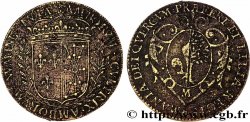E-auction 114-61530 - fjt_07313 - PARIS - ILE DE FRANCE Claude Le Peletier, prévot des marchands de Paris 1676
Devi Sign-in ed essere un offerente approvato fare un'offerta, Login per fare offerte. Conti sono soggetti ad approvazione e di approvazione sono raggiunti entro 48 ore. Non aspettare fino al giorno di una vendita si chiude per registrarti.Confermando la tua offerta su questo oggetto ti impegni ad un contratto legalmente vincolante per l'acquisto di questo prodotto e fare clic su «offerta» costituisce accettazione dei termini di utilizzo de e-auctions cgb.fr.
Offerta deve essere collocato in euro gli importi interi vendita only.The si chiuderà al momento sulla descrizione dell'oggetto, eventuali offerte pervenute al sito dopo l'orario di chiusura non verranno eseguite. Volte transmition possono variare e le offerte potrebbero essere respinto se si attende per gli ultimi secondi. Per ulteriori informazioni ckeck le FAQ.
SENZA COSTI PER GLI ACQUIRENTI.
SENZA COSTI PER GLI ACQUIRENTI.
| Valutazione : | 85 € |
| Prezzo : | 24 € |
| Offerta maxima : | 27 € |
| Data di fine vendita : | 22 giugno 2015 18:28:30 |
| partecipanti : | 7 partecipanti |
Tipo : Claude Le Peletier, prévot des marchands de Paris
Data: 1676
Metallo : argento
Diametro : 27 mm
Asse di coniazione : 12 h.
Orlo : lisse
Grado di rarità : R1
N° nelle opere di riferimento :
Diritto
Titolatura diritto : DE. LA. 4E. PREV. DE. MRE. CLAUDE. LE. PELETIER.
Descrittivo diritto : Armes de Paris.
Rovescio
Titolatura rovescio : RAMIS. FRONDESCIT. OLIVAE ; À L'EXERGUE : 1676.
Descrittivo rovescio : La massue d'Hercule en pal.
Traduzione rovescio : Elle se recouvre de feuilles d'olivier.
Commento
D'Affry de la Monnoye donne l'explication du revers Pausanias raconte qu'à Trézène, Hercule, ayant posé sa massue près du simulacre d'Hermès, cette massue d'olivier sauvage, prit racine et poussa aussitôt des feuilles Les victoires de Louis XIV sont comparées à cette massue et ont pour conséquence la paix, symbolisée par l'olivier.
Claude Le Peletier, seigneur d’Ablon, de Montmélian, de Morfontaine...., né en juin 1631, d’abord conseiller au Châtelet, il passa, le 29 janvier 1652, au Parlement, où il devint, en 1662, président de la cinquième chambre des enquêtes. Après la mort de Gaston, duc d’Orléans (2 février 1660), il fut tuteur des filles de ce prince. En 1667, il fut choisi pour doyen d’honneur de la Faculté de droit. Nommé conseiller d’État en 1673, il fut appelé, en 1683, après la mort de Colbert, au poste de contrôleur général des finances, qu’il occupa jusqu’en septembre 1689, et il fut, en outre, créé ministre d’État. En 1686, il acheta une charge de président à mortier, qu’il céda, trois ans après, à son fils Louis. Enfin, il fut chargé de la surintendance des postes en 1671, en remplacement du marquis de Louvois. Désirant le repos, il se démit de ses emplois en 1697, et il mourut, dans la retraite, le 10 août 1711, à quatre-vingt ans.
D'Affry de la Monnoye gives the explanation of the reverse Pausanias tells that at Troezen, Hercules, having placed his club near the simulacrum of Hermes, this wild olive club took root and immediately grew leaves The victories of Louis XIV are compared to this club and result in peace, symbolized by the olive tree.
Claude Le Peletier, Lord of Ablon, Montmélian, Morfontaine. . . . , born in June 1631, first councilor at the Châtelet, he moved, on January 29, 1652, to Parliament, where he became, in 1662, president of the fifth chamber of inquiries. After the death of Gaston, Duke of Orleans (February 2, 1660), he was tutor to the daughters of this prince. In 1667 he was chosen as honorary dean of the Faculty of Law. Appointed State Councilor in 1673, he was called, in 1683, after the death of Colbert, to the post of Comptroller General of Finances, which he occupied until September 1689, and he was, in addition, created Minister of State. In 1686, he bought a position as president of the mortar board, which he gave, three years later, to his son Louis. Finally, he was put in charge of the superintendence of the posts in 1671, replacing the Marquis de Louvois. Desiring rest, he resigned from his employment in 1697, and he died in retirement on August 10, 1711, at the age of eighty.
Claude Le Peletier, seigneur d’Ablon, de Montmélian, de Morfontaine...., né en juin 1631, d’abord conseiller au Châtelet, il passa, le 29 janvier 1652, au Parlement, où il devint, en 1662, président de la cinquième chambre des enquêtes. Après la mort de Gaston, duc d’Orléans (2 février 1660), il fut tuteur des filles de ce prince. En 1667, il fut choisi pour doyen d’honneur de la Faculté de droit. Nommé conseiller d’État en 1673, il fut appelé, en 1683, après la mort de Colbert, au poste de contrôleur général des finances, qu’il occupa jusqu’en septembre 1689, et il fut, en outre, créé ministre d’État. En 1686, il acheta une charge de président à mortier, qu’il céda, trois ans après, à son fils Louis. Enfin, il fut chargé de la surintendance des postes en 1671, en remplacement du marquis de Louvois. Désirant le repos, il se démit de ses emplois en 1697, et il mourut, dans la retraite, le 10 août 1711, à quatre-vingt ans.
D'Affry de la Monnoye gives the explanation of the reverse Pausanias tells that at Troezen, Hercules, having placed his club near the simulacrum of Hermes, this wild olive club took root and immediately grew leaves The victories of Louis XIV are compared to this club and result in peace, symbolized by the olive tree.
Claude Le Peletier, Lord of Ablon, Montmélian, Morfontaine. . . . , born in June 1631, first councilor at the Châtelet, he moved, on January 29, 1652, to Parliament, where he became, in 1662, president of the fifth chamber of inquiries. After the death of Gaston, Duke of Orleans (February 2, 1660), he was tutor to the daughters of this prince. In 1667 he was chosen as honorary dean of the Faculty of Law. Appointed State Councilor in 1673, he was called, in 1683, after the death of Colbert, to the post of Comptroller General of Finances, which he occupied until September 1689, and he was, in addition, created Minister of State. In 1686, he bought a position as president of the mortar board, which he gave, three years later, to his son Louis. Finally, he was put in charge of the superintendence of the posts in 1671, replacing the Marquis de Louvois. Desiring rest, he resigned from his employment in 1697, and he died in retirement on August 10, 1711, at the age of eighty.








 Segnalare un errore
Segnalare un errore Stampate la pagina
Stampate la pagina Condividi mia selezione
Condividi mia selezione Fai una domanda
Fai una domanda Consegnare / vendere
Consegnare / vendere
 Descrittivo
Descrittivo















